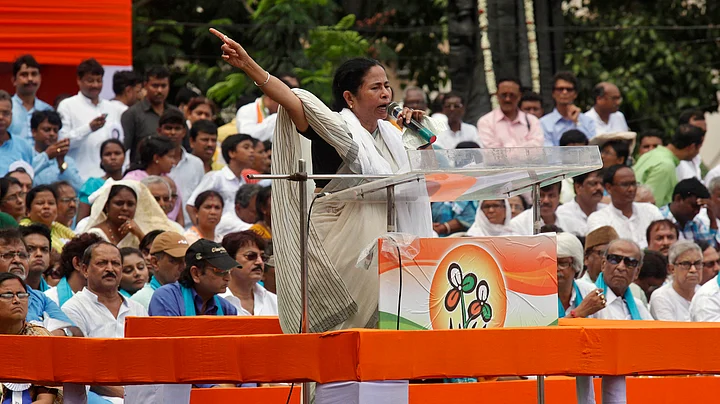“Those who cannot remember the past are condemned to repeat it”, George Santayana, Spanish philosopher, essayist, poet and novelist, famously said in the last century. And this seems coming true in West Bengal (WB).
Wooing Muslims
On Friday, May 29, 2015, Chief Minister, Mamta Banerjee felicitated and honoured Sir Mohammed ‘Allama’ Iqbal. She graced the stage with his grandson, Waleed Iqbal, who had been specially invited and flown in from Pakistan for the function organised by West Bengal Urdu Academy, to commemorate his grandfather’s contribution to Urdu literature.
Iqbal was posthumously conferred the title of Tarana-e-Hindi, which was received by Waleed, who also dons a political hat, being a leader of the Tehreek-e-Insaf (perhaps better known in India as Imran Khan’s party).
Much is made of Iqbal’s ‘Saare Jahan Se Achcha’ written in 1904 with its famous lines
Maẕhab nahīṉ sikhātā āpas meṉ bair rakhnā
Hindī haiṉ ham, wat̤an hai Hindūstāṉ hamārā
which loosely translated reads,
Religion does not teach us to bear ill-will among ourselves
We are of Hind, our homeland is Hindustan
Does Banerjee not realise that Iqbal’s worldview had changed and in 1910 he wrote another song, Tarana-e-Milli (Anthem of the Religious Community), which was composed in the same format as Saare Jahan Se Achcha, but forfeited much of the secular sentiment of the earlier song? The first stanza of Tarana-e-Milli (1910) reads:
Cīn o-ʿArab
hamārā, Hindūstāṉ hamārā
Muslim haiṉ ham, wat̤an hai sārā jahāṉ hamārā
or,
Central
Asia and Arabia are
ours, Hindustan is ours
We are Muslims, the whole world is our homeland
Subsequently, Iqbal, in his presidential address at the All India Muslim League at its Allahabad session (December, 1930) first articulated the idea of a Muslim state:
I would like to see the Punjab, North-West Frontier Provinces, Sind and Baluchistan into a single State. Self-Government within the British Empire or without the British Empire. The formation of the consolidated North-West Indian Muslim State appears to be the final destiny of the Muslims, at least of the North-West India.
The seed sown, the idea began to evolve and take root. It soon assumed the shape of Muslim state or states in the western and eastern Muslim majority zones. This is obvious from the following lines of Iqbal’s letter, of June 21, 1937, to Mohammad Ali Jinnah, only ten months before his death in April 1938:
A separate federation of Muslim Provinces, reformed on the lines I have suggested above, is the only course by which we can secure a peaceful India and save Muslims from the domination of Non-Muslims. Why should not the Muslims of North-West India and Bengal be considered as nations entitled to self-determination just as other nations in India and outside India are.
Is Didi Wrongly-Advised?
Banerjee seems to forget that WB has a sizeable 27.33% Muslim population in the last Census and reportedly up to 30% in the recently concluded one. It borders Bangladesh and there has been, by all accounts, large scale infiltration from there into WB over the years, given the porous borders, political complicity and better economic opportunity in India.
Demands for a ‘Greater Bangladesh’, incorporating several of WB’s border districts contiguous with Bangladesh, have been raised for a long time. The demographics of WB’s border districts have changed significantly over the last few decades and though may appear alarmist at this stage, one will do well to remember the journey from the Lahore Declaration of Jinnah to partition took only seven years.
Was Banerjee ill-advised or unable to find any other Urdu scholar or poet to honour? There were several others of tremendous merit without the dubious distinction of having advocated separatism. She may not have chosen a Firaq Gorakhpuri for reason of his being Raghupati Sahay in real life. But a Mirza Yaas Yagana Changezi with his strong Kolkata connection or Jigar Moradabadi, who is regarded as one of the nine immortal Urdu poets, might well have served the purpose…if it was indeed as stated. And not to play to the galleries with vote banks in mind!
The Bengali, both sides of the border, is very emotional about his language. It played a very important role in the breaking up of Pakistan. Protests broke out in the then East Pakistan (now Bangladesh) against West Pakistan’s imposition of Urdu on February 1, 1952. It took several years of struggle for Bengali’s official language status to be restored. Even today, February 21 is celebrated in Bangladesh as the Bengali Language Movement day.
Learning another language is something to be supported. However, does the increased acceptance of Urdu by Bengali Muslims in WB (encouraged by the state apparatus) signify a growing influence of the Wahabi school of Islam? It is now being used, even replacing Bengali, in mosque sermons, which is indeed a paradigm shift. We do live in interesting times!
(The writer is a businessman but more interested in affairs of state rather than the state of affairs.)
(At The Quint, we question everything. Play an active role in shaping our journalism by becoming a member today.)
